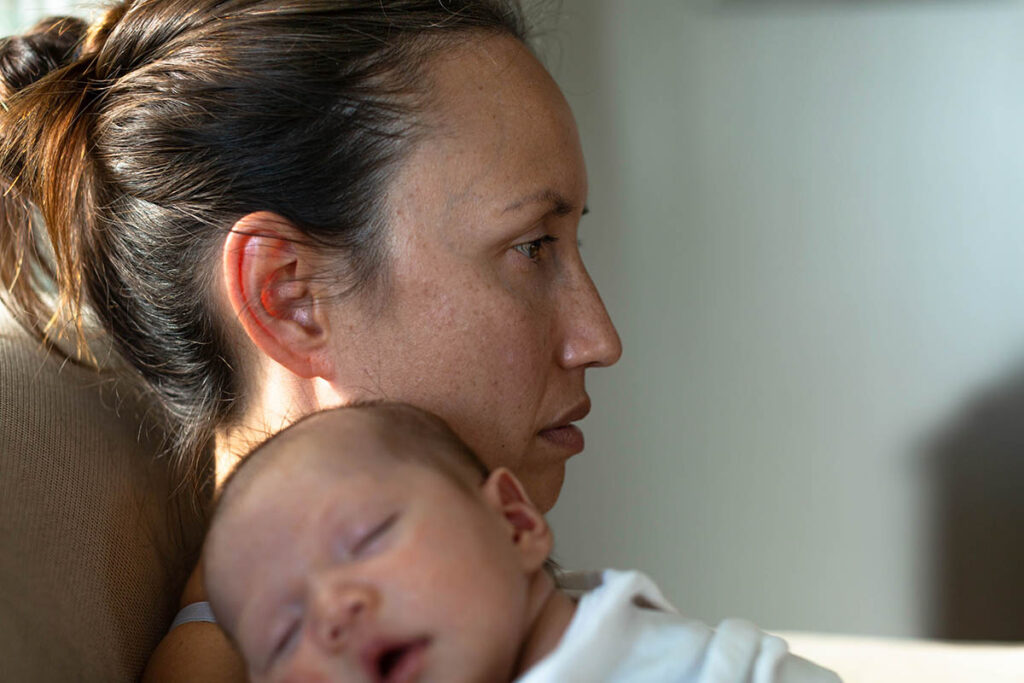Welcoming a new baby into the world is a monumental life event, often filled with joy, anticipation, and love. However, for many new mothers, this period can also be marked by an unexpected guest: depression after giving birth, also known as postpartum depression. Navigating these overwhelming feelings can be challenging, and too often, silence surrounds this topic. We aim to break this silence, offering a safe space to understand, discuss, and seek help for postpartum depression and reminding you that you’re not alone in this journey.
Postpartum depression in new mothers can be devastating. If you’re looking for postpartum depression treatment, contact Peer Mental Wellness at 714.844.5473 for treatment options in Santa Ana.
What Is Postpartum Depression?
Postpartum depression is a form of major depression that can occur in new mothers following childbirth. Its symptoms can range from mild to severe. They may include persistent feelings of sadness, anxiety, or emptiness, significant changes in appetite or sleep patterns, and difficulty bonding with your baby. It’s important to note that these feelings go beyond the “baby blues.” This term commonly describes the brief period of mood swings, tearfulness, and fatigue many women experience after birth.
Postpartum depression symptoms are more intense, last longer, and can significantly interfere with your ability to care for your baby or handle other daily tasks. If you suspect you’re experiencing postpartum depression, it’s crucial to seek help promptly; remember, asking for help is a sign of strength and the first step towards feeling better.
Signs of Depression in New Mothers
Recognizing the signs of depression in new mothers is an essential first step in seeking help. These signs can vary significantly from one individual to another, but there are a few common symptoms to look out for:
- Persistent feelings of sadness or emptiness that last for more than two weeks
- Lack of interest or pleasure in activities you once enjoyed
- Significant changes in appetite or weight
- Difficulty sleeping or excessive sleeping
- Fatigue or decreased energy
- Difficulty bonding with your baby
- Thoughts of death or suicide
If you or someone you know is experiencing any of these symptoms, it’s essential to reach out to a healthcare provider immediately. Remember, it’s okay to ask for help. You’re not alone in your journey, and numerous resources are available to assist you.
Treatment for Postpartum Depression
Treatment options for postpartum depression are varied and depend on the severity of the symptoms and individual circumstances. It’s important to remember that treatment is available and effective. You won’t always feel like this, and seeking help is crucial. Your healthcare provider can help devise a treatment plan tailored to suit your needs and situation. Remember, it’s okay to ask for help, and taking the step to seek treatment is a sign of strength, not weakness.
- Psychotherapy – This may involve cognitive-behavioral therapy (CBT) or interpersonal therapy (IPT). Both types of therapy can be highly effective in treating postpartum depression.
- Medication – Your healthcare provider may recommend certain antidepressants that are safe to take while breastfeeding.
- Hormone therapy – Estrogen replacement may help counteract the rapid drop in estrogen that occurs after childbirth, which may contribute to mood swings.
- Support groups – Connecting with other new mothers experiencing the same struggles can provide a sense of community and shared understanding.
- Self-care – Regular physical activity, a healthy diet, adequate sleep, and taking time for yourself can all help manage symptoms of depression.
As you explore these options, remember that recovery takes time, and everyone’s journey is unique. With the proper support and treatment plan, you will get through this. There is a network of support ready to help you every step of the way.
Call Peer Mental Wellness for Treatment for Postpartum Depression
At Peer Mental Wellness, we understand how difficult and isolating postpartum depression can feel. Our team of skilled professionals is dedicated to providing compassionate and effective treatment for new mothers struggling with postpartum depression.
Contact us today at 714.844.5473 to schedule an appointment in our Santa Ana office. Take the first step towards finding relief from postpartum depression.




